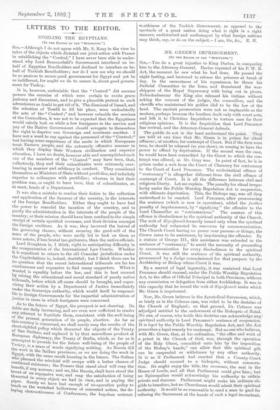LETTERS TO THE EDITOR.
SPOILING THE EGYPTIANS.
ITO TEE EDITOR OF THE " SPECTATOR.")
Sin,—Although I do not agree with Mr. S. Keay in the view he takes of the objects which dictated our joint action with France in establishing the " Control," I have never been able to under- stand why Lord Beaconsfield's Government interfered on be- half of Egyptian Bondholders and declined to interfere on be- half of Turkish Bondholders ; nor do I now see why we should be so anxious to secure good government for Egypt and yet be so indifferent, for aught we do to secure it, about good govern- ment for Turkey.
It is, however, undeniable that the " Control" did assume powers the exercise of which were certain to excite grave jealousy and discontent, and to give a plausible pretext to such adventurers as Arabi to get rid of it. The dismissal of Ismail, and the selection of Tewfik to fill his place, were undoubtedly the acts of the " Control ;" and however valuable the services of the Controllers, it was not to be expected that the Egyptians would calmly look on while a few foreigners in the service and pay of the Native GovernMent should arrogate to themselves the right to deprive one Sovereign and nominate another. I have not a word to say against the personnel of the " Control ;" but having some experience of the mode in which Europeans treat Eastern people, and the extremely offensive manner in which they display their Western civilisation and superior education, I have no doubt, however able and accomplished each one of the members of the " Control " may have been, that, collectively, they and their subordinates were extremely over- bearing in manner and arbitrary in conduct. They considered themselves as Ministers of State without portfolios, and infinitely superior to colleagues with portfolios ; whereas in fact their position was, or ought to have been, that of subordinates, or, at most, heads of a Department.
It was also a mistake to confine their duties to the collection and application of the finances of the country, in the interests of the foreign Bondholders. Either they ought to have had the power to remodel the taxation of the country, and to purify the administration in the interests of the people of the country; or their mission should have been confined to the simple receipt of certain specified revenues, and their division amongst the foreign creditors. As it was, they incurred the hatred of the governing classes, without securing the good-will of the mass of the people, who were easily led to look on them as more astute, if less brutal tax-gatherers, than the native officials. Lord Houghton is, I think, right in anticipating difficulty in the reorganisation of the International Law Courts. Whether it is expedient to return to the old Consular jurisdiction under the Capitulations is, indeed, doubtful ; but I think there can be no question that the recent international tribunals are far too cumbersome and expensive to find many supporters. What is wanted is equality before the law, and this is best secured by raising the educational and moral standard of purely native tribunals, before which all cases should be brought, and super- vising their action by a Department of Justice immediately under the Sovereign authority, which would itself be responsi- ble to foreign Governments for the impartial administration of justice in cases in which foreigners were concerned. As to the future of Egypt, the prospect is not cheering. Its debts are daily increasing, and are even now sufficient to render any attempt to liquidate them, consistent with the well-being of the present generation of its people, abortive. As far as this hi country is concerned, we shall surely reap the results of the short-sighted policy which thwarted the objects of the Treaty of San Stefano, and replaced it by that marvellous product of European diplomacy, the Treaty of Berlin, which, so far as it at tempted to provide for the future well-being of the people of Turkey, is a mass of words signifying nothing. As Russia did the work in the Balkan provinces, so we are doing the work in Egypt, with the same result looming in the future. The Sultan who planned the mischief will escape with a better chance of continued existence ; the Powers that stand aloof will reap the benefit, if any accrues ; and we, like Russia, shall have stood the of brunt _ expensive • • every object war, and reap the satisfaction of being thwarted in :leet we had in view, and in paying the Piper. Surely we have had enough of co-operative policy to teach us the wretched hollowness of concerted action, the de- laying obstructiveness of Conferences, the hopeless untrust- worthiness of the Turkish Government, as opposed to the spectacle of a great nation doing what is right in a right manner, undisturbed and undismayed by what foreign nations may think, say, or do on the subject. —I am, Sir, &c., E. H.






























 Previous page
Previous page